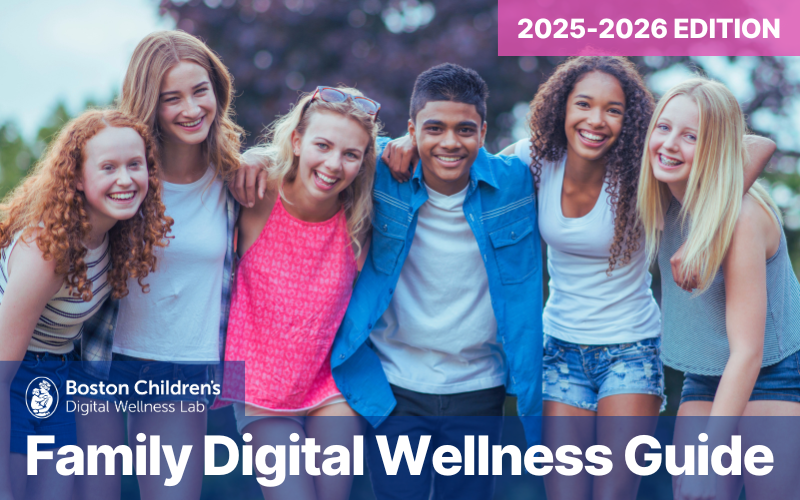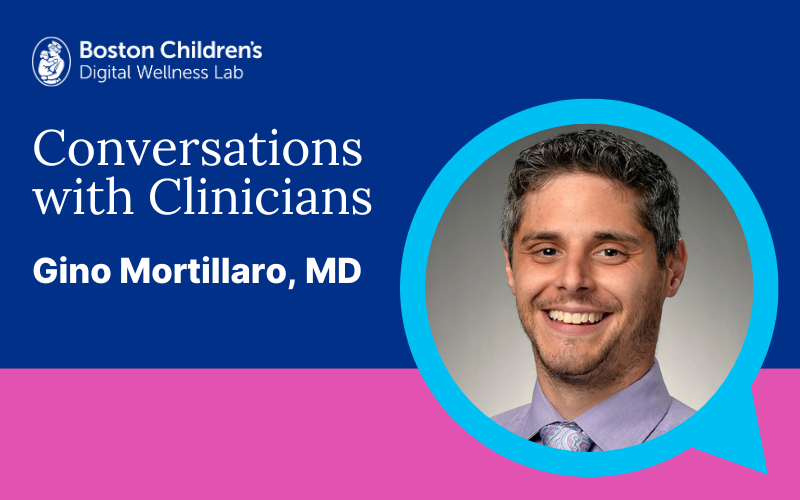Gino Mortillaro, MD
Medical Director of Emergency Psychiatric Services, Boston Children’s Hospital
Instructor, Harvard Medical School
Adjunct Clinical Faculty, Kaiser Permanente School of Medicine
What does “a day in your life” look like?
As a Child and Adolescent Psychiatrist, my day is a hybrid of clinical and administrative. Most mornings I am rounding with the medical and mental health teams in the ER on all of our patients who are in need of emergency mental health treatment and stabilization. The latter half of my day is usually spent in either administrative or research meetings to identify ways to continue to strive for the best possible care delivery to our patients and advance the field of pediatric mental health.
What led you to this work?
I have wanted to be a child psychiatrist for nearly my entire life! As an early teen, I told my mother that I wanted to grow up and be Frasier Crane. I believe the emotional skill building done in our early childhood sets the foundation for the rest of our lives, so dedicating myself to supporting this critical period has been a guiding light for my career
What are the greatest opportunities you see for kids growing up in a digitally-saturated world?
With the digital era, there is an increase in accessibility of information and healthcare to children and teens who may not have had access to similar resources based on where they live or family resources. This ease can also facilitate international friendships and communication with much greater ease, making it a method to reduce xenophobia through early cultural exposure.
What are the greatest challenges you see for kids growing up in a digitally-saturated world?
However, this same access can be the greatest challenge to children growing up with an unfettered amount of information, allowing for exposure to inappropriate material for their age or to adult content and making children more vulnerable to victimization. Additionally, there is increased exposure in online spaces through social media where kids may be subjected to increased criticism, judgment, or negative comments at a magnitude they may not have experienced “IRL.” This scenario can be damaging to their developing confidence and sense of self.
How would you change or design technology and/or media to be healthier for kids across the developmental span?
Media in general has seen an explosion in content that offers skewed views of the world packaged under a “reality” umbrella. Whether they be popular TV shows, influencers, or “rage-bait”, these windows are designed to promote sensational and engaging content packaged under the premise of a normal daily life for the individuals at the center of the content. However, oftentimes these are idealized versions made possible by things like extravagant wealth, heavy filtering, brand partnerships, scripted events, or surgical enhancements that are not acknowledged, and instead presented as a natural occurrence of everyday life. This has resulted in many young people who engage with this content feeling disappointment in their own life, or struggling with body image as these external social pressures have presented a skewed perspective on what they should look like or the life they should live. In my view, a positive change in media would involve offering a more balanced narrative with full disclosures of dramatizations and brand partnerships / sponsorships, eliminating filters entirely, and demonetizing controversial material such as rage-bait or Pro-Ana (pro-anorexia) content.
What guidance or advice do you have for parents and other caregivers to help kids to build and maintain healthy behaviors around digital media and technology?
The most pivotal thing that parents can do is to set limits with technology from the very beginning of a child’s life. One common misstep parents struggle with is utilizing the TV, phone, or tablet to distract and soothe an upset child; however, this can create problematic patterns as the child develops because it can lead to a failure to develop natural self soothing emotional coping skills and instead rely on external factors, in this case media, to manage their emotions for them. Another potential issue is as these children enter school age where they are unable to have their preferred media access at any time, there can be an increase in acting out behaviors in school as they don’t have a method of emotional regulation without accessing media. This can be a risk to their long term social and academic growth as it can impede successfully establishing friendships, or their ability to safely remain in school.
Is there anything else you’d like to share?
One of the most important things for parents to remember is they are setting the example for their children in all things in life, including media use. So, remembering to be mindful of the time they are spending on their phone, watching TV, or playing video games in front of their children, as well as using these opportunities to demonstrate setting limits for themselves on use and putting devices away for one-on-one time with their children, can set a positive example for developing youth. Additionally, for parents of children interested in gaming, setting aside time to play games with your child can be a way for parents and children to bond through engaging in the child’s interest while also affording parents the opportunity to experience the game directly and make sure the content is appropriate for their child.
Here at the Lab, we welcome different viewpoints and perspectives. However, the opinions and ideas expressed here do not necessarily represent the views, research, or recommendations of the Digital Wellness Lab, Boston Children’s Hospital, or affiliates.








